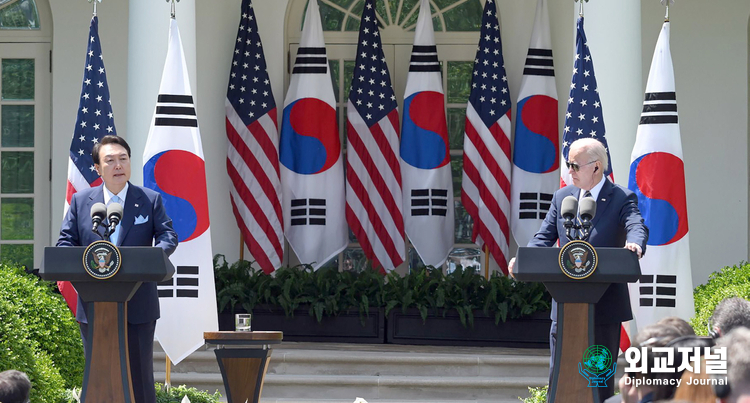
President Yoon Suk-yol announced on May 2 that through the recent summit, the South Korea-US alliance established five pillars of cooperation on top of the foundation of a "value alliance," which are the security alliance, industrial alliance, science and technology alliance, cultural alliance, and information alliance.
During the national security meeting held at the Seoul Blue House on that day, President Yoon stated that the South Korea-US alliance has been upgraded to a new paradigm based on nuclear deterrence through the Washington Declaration. He also remarked that when the alliance was first formed in 1953, South Korea had nothing.
President Yoon also explained that the recent visit to the United States was a time to celebrate the 70th anniversary of the South Korea-US alliance, reflect on the history of the alliance, and discuss a blueprint for the future of the alliance with the United States. He added that the alliance between the two countries has also been an occasion to celebrate the successful 70th anniversary of the alliance with their respective citizens. President Yoon emphasized "In 1950, when the country's survival was at stake due to the North Korean invasion, many young Americans sacrificed their lives to protect the freedom of a country and its people they had never heard of, seen, or met before.
He added that ”the Republic of Korea has overcome the gruesome wounds and ruins of war and achieved today's prosperity, standing tall as the center of the world, thanks to the tremendous support provided by the United States over the past 70 years through the ROK-US alliance, which has played a central role in our diplomacy and economy and supported the freedom and Korea." President Yoon stated that "the highest and closest relationship in diplomatic relations is an alliance" and emphasized that "having a 70- year alliance with the world's strongest country carries a special meaning."
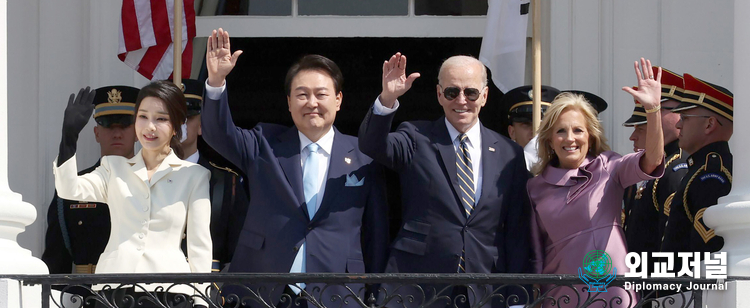
Furthermore, he added that "the 70-year history of the ROK-US alliance was not just given to us as a matter of course," and emphasized the importance of expressing gratitude for things that we are thankful for in our national relationships, which adds to our national dignity and enables us to properly establish ourselves in the international community." President Yoon added, "While the alliance has been maintained for 70 years, we should also take pride in our own history of growth and development as a nation, which was achieved through the hard work of our people and the strong support of the United States as a powerful ally in our economic growth."
President Yoon stated during his speech to the U.S. Congress last week, "As a representative of the Korean people, I express my gratitude to the United States and the American people who have accompanied us on our journey to protect and nurture our freedom. At the same time, I want to let the people of both countries and the world know that a new era of the ROK-US alliance has begun." He also said "The results and achievements of this summit are just the beginning, and the scope of the alliance will continue to expand, and the opportunities for the people of both countries will only grow.".
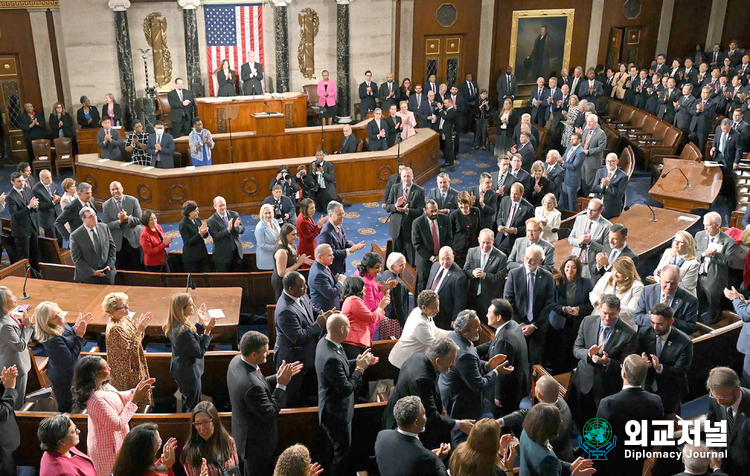
President Yoon stated, "Firstly, as an alliance for security, we have dramatically strengthened the execution of our deterrence and defense capabilities. The Washington Declaration outlines a plan for pursuing 'Korea-style deterrence and defense,' and includes a detailed implementation plan." He added "The Nuclear Consultative Group (NCG), which has been established as a permanent high-level consultative body between South Korea and the United States, can be considered more effective than NATO's Nuclear Planning Group (NPG) in that it meets more frequently and discusses issues more deeply on a one-on-one basis." He also stated, "The United States will maintain an overwhelmingly strong deterrence posture by regularly deploying its powerful strategic assets near South Korea."
President Yoon stated that "We will build a strong security that future generations can grow their dreams with confidence through peace achieved by overwhelming power, not fake peace relying on the goodwill of the other side." He emphasized the importance of effectively implementing the Washington Declaration in the process of sharing information, planning, and executing joint operations related to the use of U.S. nuclear assets and filling in its contents well.
Also he said "In the past 70 years, tremendous changes have occurred, and the security umbrella provided by the alliance has greatly contributed to our growth and the expansion of our freedom." He also mentioned that "Along with the modernization of our defence capabilities, the level of mutual defence between South Korea and the United States has been raised." He added, "The upgraded South Korea-US security alliance, based on nuclear deterrence, is now expanding into supply chain, industry, and science and technology alliances," and "The South Korea-US science and technology alliance is expanding its scope from emerging technologies such as semiconductors, batteries, clean hydrogen, AI, quantum, and SMR," he explained.
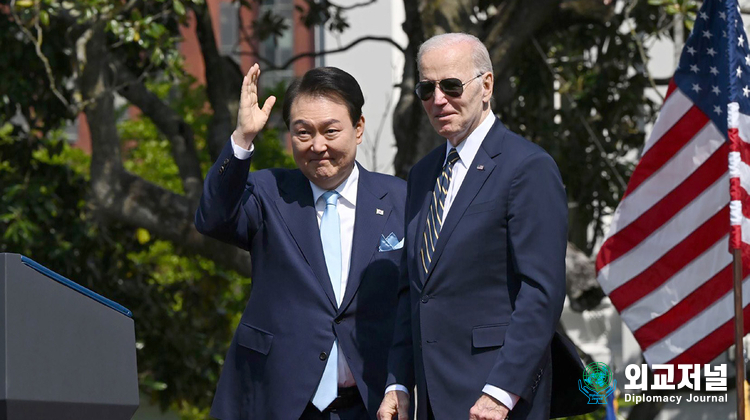
Furthermore, president Yoon said "the synergy between the United States' core foundational technologies and South Korea's advanced manufacturing capabilities can benefit both countries" and that "if the two countries engage in joint research and development investment in advanced science and technology, we can also access the core foundational technologies led by the United States."
In particular, the United States and South Korea are optimal partners for expanding friend-sharing because they share the value of freedom and are closely connected economically through infrastructure. He emphasized that during the Business Roundtable attended by over 120 Korean economic figures and global business leaders accompanying him, one could see their passion for supply chain collaboration between companies in all fields of advanced industries between the two countries.
President Yoon said, "Leading bio companies in the United States are increasing their investment in bio production facilities in Korea, and our battery companies are transforming Georgia and Michigan into hubs for electric cars, which are good examples." He also stated, "The 'Next Generation Core and Emerging Technologies Dialogue' newly established between the ROK and the United States will serve as a control tower to establish a strategy for the ROK-U.S. technology alliance." He added, "During this visit to the United States, major advanced industry companies have decided to invest a total of 5.9 billion dollars, and 50 MOUs have been signed between companies and institutions of both countries." He added, "Investment by U.S. companies in Korea will continue to expand."
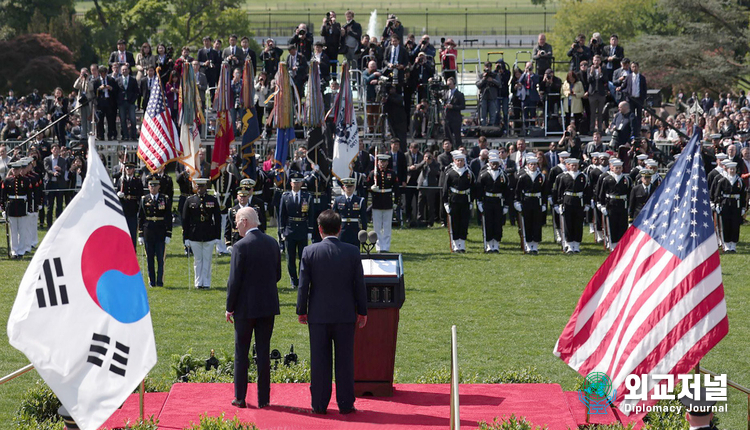
President Yoon mentioned that during his visit to Boston after his schedule in Washington D.C., he visited Harvard and MIT universities and had discussions with professors who are the top authorities in their respective fields, and talked with students. He felt that Harvard, representing the essence of freedom, and MIT, representing advanced science and technology, are leading the future of the United States.
President Yoon said "It is precisely the spirit of freedom that leads advanced science and technology through creativity and innovation." He added, "The Boston cluster, which has established an ecosystem of industry-academia joint research in fields such as bio-health, life science, robotics, and IT, inspires us a lot." Yoon explained that a fair reward system that creates innovation is being operated by a combination of the free market mechanism and the government's leading strategy. He also said, "The Defense Advanced Research Projects Agency (DARPA) located near Washington D.C. performs the role of the brain in technology development, identifying and excavating future strategic technology projects necessary for national security in advance."
Moreover, "We need to identify the priority areas for future technology development and concentrate national R&D funds on promising research teams and institutions to establish a Korean-style public-private-academic joint venture model that attracts private investment." He added, "The operating system of the Boston cluster proves that a market where free choice and contracts are made expands our freedom."
During this visit to the United States, President Yoon stated that "as a value-sharing alliance based on freedom, the South Korea-U.S. alliance will contribute greatly to expanding the freedom and prosperity of both nations' citizens and people around the world as a technological alliance for advanced science and technology." He also mentioned that he met with leaders in the global film and content industry, such as Warner Brothers, Paramount, Netflix, Universal Sony Pictures, and Disney, in Washington, D.C., to discuss cultural cooperation between the two countries.
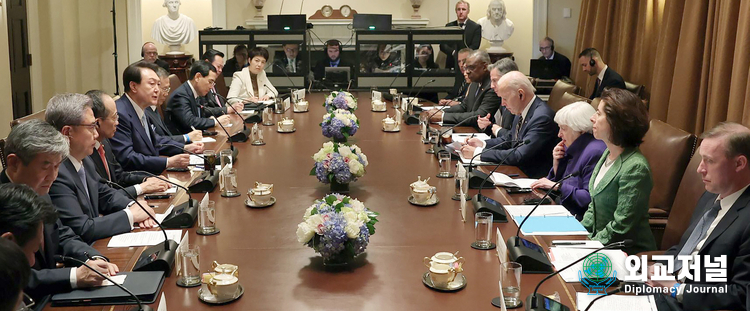
President Yoon stated that "these g lobal companies showed great interest and enthusiasm for investing in Korea. I told them that Korea's market will be unified with the global market and encouraged them to invest as much as they want." He also promised to remove any regulations that hinder investment in Korean businesses. President Yoon also mentioned that "Netflix has decided to invest 2.5 billion dollars, or about 3.3 trillion won, in K-content over the next four years" and that "these global companies will expand their investment in Korea in the future." President Yoon also stated that "As seen in mega-hit works like 'Squid Game', the synergy between Korean content and American platforms is creating tremendous results" and added, "Based on the value of freedom, the Korea-US alliance will manifest as a cultural alliance that creates synergy in the cultural industries of both countries."
Additionally, he explained that "Korea and the United States have further strengthened their people-to-people exchange programs," and that "the 'Korea-U.S. Youth Special Exchange Initiative' launched by both countries will establish a joint fund of $60 million to promote youth exchange in the fields of science, technology, engineering, and mathematics (STEM) as well as humanities and social sciences." Additionally, President Yoon stated that "the WEST program, which allows students to work and study English for up to 1 year and 6 months in the US, will be expanded from an annual 2,000 participants to 2,500 participants," and added that "it is natural to extend this temporary program."
President Yoon stated that "If international R&D cooperation between Korea and the United States is strengthened, personnel exchanges in advanced fields will deepen even further," and that "if the two countries invest in R&D in each other's countries, exchanges between professionals and researchers in both countries will be further expanded."
Furthermore, Yoon stated that "moving forward, the two countries have agreed to expand the scope of alliance operations to the cyberspace and outer space, in response to the evolving security environment" and that "the 'Strategic Cybersecurity Cooperation Framework' adopted by the South Korean and US NSCs will play a role in enhancing cooperation in cybersecurity technology, policies, and strategies, including the sharing of information between the two countries." Yoon also added “during the recent summit, d that the joint statement adopted by the South Korean Ministry of Science and ICT and NASA will elevate the space cooperation between the two countries to the level of a space alliance.”
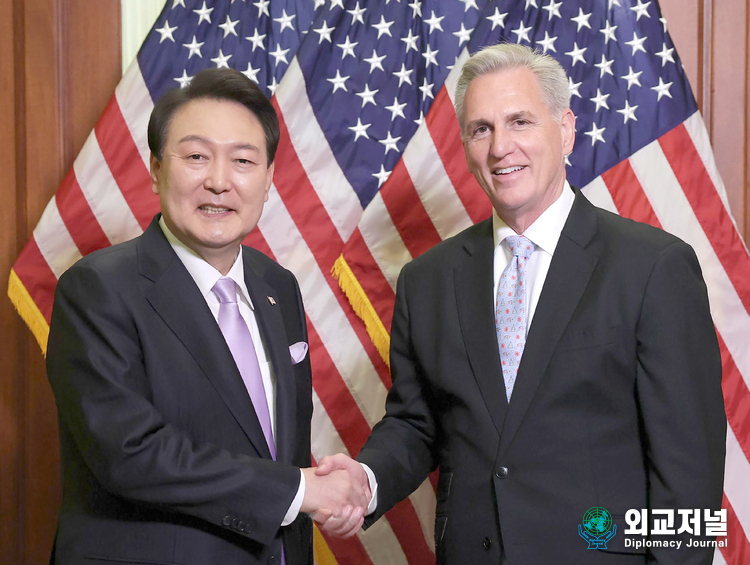
President Yoon stated "the upcoming establishment of the Korea Aero Space Administration(KASA) will lead to joint research and development programs with the United States NASA, and this will be followed by the exchange of advanced scientific and technological personnel. The space alliance between South Korea and the United States will contribute significantly to resolving global agendas such as climate change." Meanwhile, President Yoon emphasized that "the ROK-US alliance is a blood alliance forged by the blood shed by the young people of both countries during the Korean War," and that "the ROK-US alliance is not a convenient contractual relationship that meets and separates according to interests."
Finally, President Yoon emphasized that "the ROK-US alliance is a values-based alliance rooted in universal values of freedom and democracy," and that it is a "just alliance that contributes to world peace and prosperity."
President Yoon asked the National Security Council to take detailed follow-up measures to expand the scope of the South Korea-US alliance to various fields such as industry, science and technology, and culture, providing a greater platform of opportunities for the younger generation in both countries.


